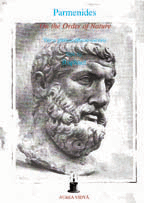|
BIOGRAPHICAL NOTES ON PARMENIDES

FROM PARMENIDES, ON THE ORDER OF NATURE, FOR A PHILOSOPHICAL ASCESIS
EDITED BY RAPHAEL. AUREA VIDYA, 2009
The date of Parmenides birth is uncertain but, according to the indications of Apollodoros, it can be placed between the sixth and the fifth centuries B.C. Parmenides was born in Magna Graecia, in Elea (today’s Velia) located on the coast of Campania south of Paestum, into a family of noble lineage and quite well off. It is known that he governed and gave very good laws to his city (in those days, as it happened, cities were governed by Philosophers), and every year the Eleans pledged their loyalty to those laws. The Pythagorean Ameinias introduced Parmenides to the peace of contemplation, and because of this relationship, Parmenides himself is considered a Pythagorean.
The Eleatic constitutes a “beacon” whose light illumined Plato and even Aristotle, and consequently all the philosophers that followed.
Parmenides laid down several fundamental philosophical principles:
1. The Being as foundation of all the existent
2. The principle of identity, Being is identical to itself (Fr. 4; Fr. 8, 12, 25)
3. The principle of non-contradiction (Fr. 8, 15), which subsequently Aristotle also developed at both the logical and the epistemological level.
4. The principle of a-temporality or eternal present (Fr. 8, 3 and following), while the time aspect (becoming) he puts into d’oxa.
5. He has given an initiatory philosophical vision of an experimental order, therefore the Poem cannot leave this vision aside.
This implies that the human entity is put in the conditions to assimilate to Being, having the ontological dignity of it.
Parmenides’ vision was taken up by Plato and others down to Plotinus and beyond, while staying within the Classical Greek tradition.
With Parmenides began what is called, in more specific terms, true Philosophy.
Thus it is not a vision of religious order, the way this term is commonly meant. Religion is, in fact, in the domain of duality, of a passive subject in front of something which is outside of itself, with a marked difference between Creator and creature.
The initiatory way, or way of knowledge, is an active way in which it is recognized that the nature of Being is within us as well, as nous, essence. In terms of Vedanta it corresponds to paravidya (supreme knowledge). Parmenides received the initiation directly from the Goddess Dike. The other Goddesses mentioned in the Poem are characterizations, aspects or principles, which are refracted by the one Goddess who, in this case, represents the incarnation of the supreme Truth and the principial cause of manifestation.
The first part of the Poem, which is the most important part, appears to be complete, while that regarding the world of “appearances” is made up of only disconnected fragments, and at times there are just a few words, and therefore difficult to decipher and interpret.
The entire Poem consists of 154 verses. The title “About Nature” (perì fiuseos) is a later addition. It appears for the first time in Simplicius’ De coelo (1). Fiuseos (of the text) also means “Natural Order” which corresponds to the Vedantic Rita.
It is thought that the theogony of Parmenides was inspired by that of Hesiod, but one cannot give credit to this hypothesis because there are fundamental differences between them (2).
Hesiod, as also Pherecydes of Syrus, proposes that the world was born from the Gods, each with their function; this proposition is a mythical cosmogony, it is an exposition of facts. Parmenides instead expounds a theogony which does not talk about facts. Some points may be considered scientific, while other points deal with astrological aspects. Furthermore, Parmenides places what is born in the sphere of “appearances”, of phenomena, in d’oxa rather than in the sphere of Truth, nevertheless comparing it with the reality of Being.
For the Eleatic the primary aim is the search for the ultimate Truth, beyond cosmogonic factors. Starting from this level of consciousness, Parmenides cannot avoid considering as “appearance” cosmogony itself which operates in time and in history.
From this standpoint, one could say that Parmenides was the first metaphysician in the history of Western philosophy. Metaphysician because he positioned himself beyond time, space and cause. The mortal compared with the immortal may consider himself a accident, something which may or may not be. The non-born (a-ghenetos), the ungenerated always stays in its a-temporal aspect.
For the Eleatic the "eternal" has a connotation not of duration, even if indefinite, but of negation of time itself. If Being is a-ghenetos it cannot have a temporal succession, since the temporal condition belongs to d’oxa.
Moreover, the Eleatic expresses in “dry” terms the reality of Being, the relativity of the phenomena and the fallacy of the opinion of the mortals. Plato calls him “venerable and also fearsome” (Theaetetus, 183e). But at the same time this Being unveils itself in the very a-temporal and immortal (nous) dimension of the human entity as the foundation of his existing and being. The being is his aim for liberating himself from the error in which he dwells.
Parmenides in the vision of Being has not connected other dialectical relationships and he has not attributed other meanings except that “Being is and cannot not be”. It will be Aristotle’s task to give multiple meanings to Being, unmoved mover (to kinoun akìneton), but Aristotle’s philosophy can be considered an Ontology and not pure Metaphysics.
The idea of Being has been the paradigm of the entire Western Philosophy. Both Plato and Aristotle, as it was said, are indebted to the Eleatic, and not only for the idea of Being.
Parmenides does not place the world of becoming in “nothingness” because he himself states that you can neither think nor speak of nothingness.
«Also this you have to learn: how those things which appear must be evaluated in a correct manner»
(Fr. 1, 31-32)
Thus, the error of the mortals consists only in considering the “appearances”, or the phenomena, as reality and absolute truths. On the contrary what is needed is to know how to evaluate appearances in the correct manner and see them for what they are in their own nature.
In the field of Western Philosophy Parmenides’ influence can be noted by the following:
– A logical dialectical rigor in the exposition
– An existential vision addressed to the human entity
– A truth coming from on high and not empirically theorized or conceptualized by the dianoetic mind
Such a sacred vision can be revolutionary in a culture that, given the signs of the times, is characterized by a gloomy spiritual, ethical, cultural and political impoverishment.

|
|
|